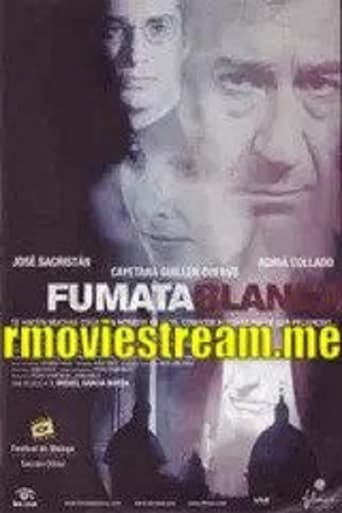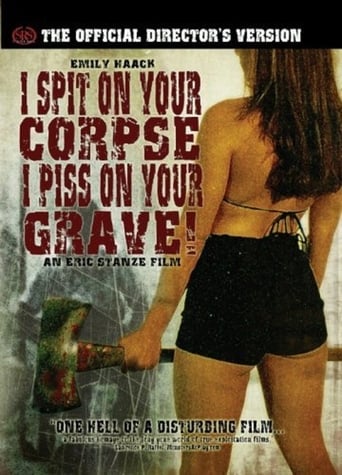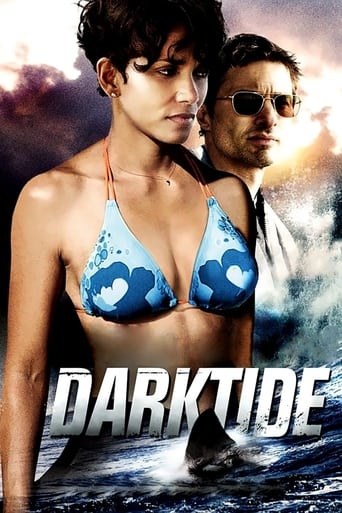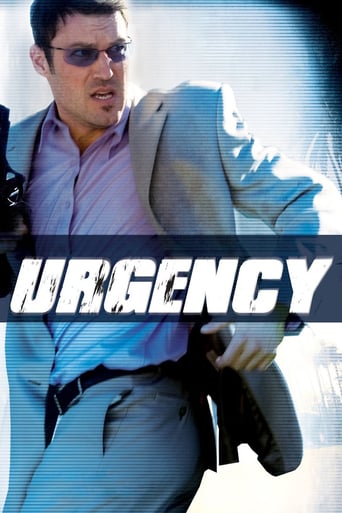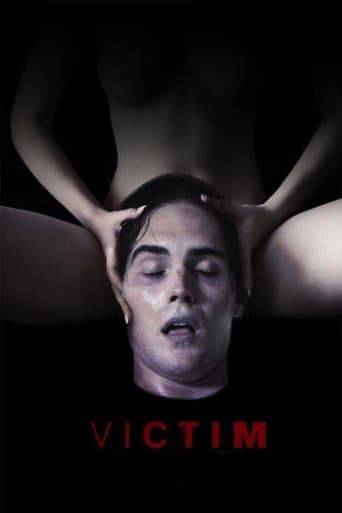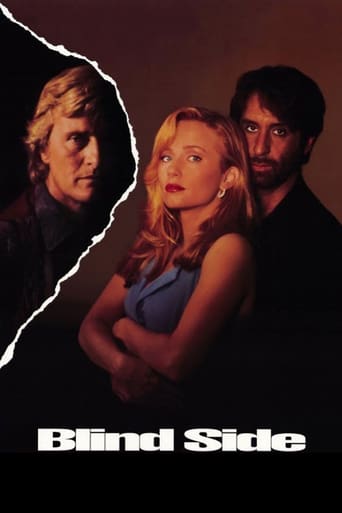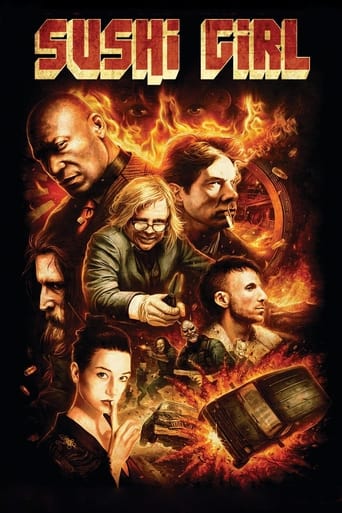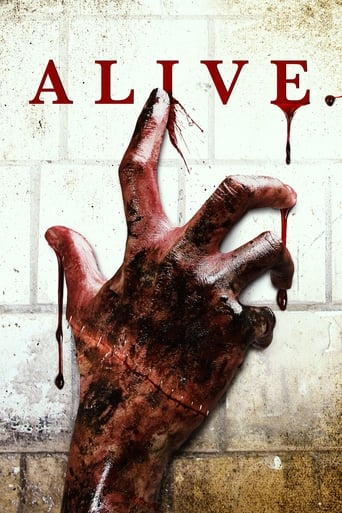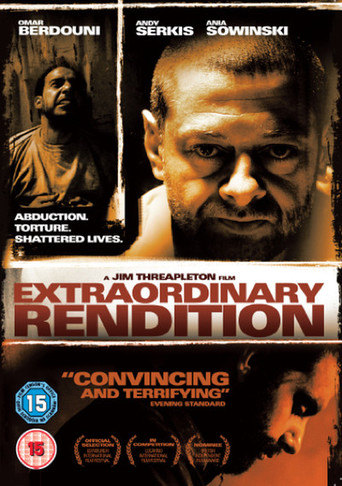

Extraordinary Rendition (2007)
A man is abducted from the streets of London and transported via secret flights to an unknown country. Held in solitary confinement and cut off from the outside world, he is plunged into a lawless nightmare of detention without trial, interrogation and torture. Returned without explanation to the UK many months later, he is left to pick up the pieces of a shattered life in a world he no longer recognises.
Watch Trailer
Cast


Similar titles
Reviews
It's entirely possible that sending the audience out feeling lousy was intentional
a film so unique, intoxicating and bizarre that it not only demands another viewing, but is also forgivable as a satirical comedy where the jokes eventually take the back seat.
Blistering performances.
By the time the dramatic fireworks start popping off, each one feels earned.
Where to begin, as we discuss "Extraordinary Rendition"? Perhaps it might be best to start with the film's positive aspects, and then move onto its negatives. So, here are its PRO's: The performances of the three main leads are quite brilliant. Omar Berdouni - an excellent actor who (with the exception of...say...the big part he played in the first episode of Channel 4's Bernard-Hill-narrated "Ancient Egyptians" several years ago) has of late played numerous characters in 9/11-tinged films (such as "The Kingdom" and two Paul Greengrass films, "United 93" and "Green Zone") and TV shows (notably the BBC drama "Occupation") - plays another character set in a post-9/11 world, only this time is the main focus of the film, instead of a supporting player. From start to finish, Berdouni imbues his thinly written character with enough believability and sympathy for the viewer to care for him as he is plucked from the streets of London, and thrown headfirst into a terrifying and inexplicable situation of endless fear and torture. Berdouni never overdoes it; he keeps his character's emotions cool and calm at the start, and when he is subjected to his horrific ordeal, his anger, frustration and fear can all be seen bubbling under the surface, until cracks start to appear - and when those cracks do break, the result is truly poignant. Ania Sowinski does very well with what little she has to work with, as Berdouni's character's wife. To begin with, her character isn't objectionable at all, and is well above being just a serviceable wife character for the main male protagonist to bounce off of at the film's start. Unfortunately, by the film's end, her character becomes terribly predictable and unreasonably whiny, for reasons that the film never takes the time to explain (if it even has a reason with which to help explain her ultimate behaviour). But the real star of the film, once again becoming a major scene-stealer (even for such a dark role), is Andy Serkis. He plays a haggard, fatigued and despicable interrogator, whose job it is to extract the information he believes Berdouni's character has, but clearly doesn't have. Serkis doesn't play this person as a straight-up evil bad guy - by his own word (which may or may not be true), he's a man with a family, trying to earn his keep through this job that he hates. True to his character's form, he almost makes you think that this might be true, and almost makes Berdouni's character think that he did something to deserve the punishment he goes through. As for the torture scenes, they are as about as horrifying as you might expect. Eventually, the process of having seen so much of this horror played out before your eyes (the most unsettling torture scene being the one involving "dry drowning") leaves the viewer exhausted - probably something the film-makers fully intended. But now for the CON's: As hinted above, the script isn't particularly well fleshed out and written. The characters are mere sketches of proper human beings, leaving the actors to have to try and do the fleshing out themselves. The story is provocative and disturbing, but it lacks the proper hefty dramatic weight needed to make it stick in the mind. As well as that, the structure of the story aims for a Christopher Nolan-esque non-chronological story jumble, which in this film's case makes the proceedings occasionally confusing. There's no real need or reason for this shuffling of story chapters to take place, other than for some stylistic verve. Unfortunately, the film doesn't really have the metaphorical meat on its bones, nor the running time, nor the budget, for this to work properly. The editing, meanwhile, is almost unwatchably choppy. If you've seen the "Transformers" films and think their editing is too slipshod, then prepare to re-evaluate that opinion. And overall, the film feels just far too rushed. Its running time is only 77 minutes! Even an episode of "Sherlock" is longer than this. All through the film, I kept catching myself thinking that a lot of the scenes needed to be slightly longer, to allow the atmosphere of each scene to breath and be fully appreciated. It's hard to explain with words, but if you ever see the film, you'll know what I mean. In the end, it's a film with admirably dark and provocative themes, pulled off with a tiny budget, great acting, and which does what it sets out to do - shock, disturb and make you think. But technically, it could've been done so much better, with a better eye for characters, atmosphere, tension, and drama...
As 2007 British produced, minimalist drama Extraordinary Rendition rolls on, it eventually comes to find a sort of middle ground with both itself and its subject matter; the film an intermediate if overly and in a somewhat disappointing fashion, liberal effort depicting the sorts of negative energies and sensibilities that are born out of initial feelings of state-led hatred and paranoia. Here, the key is that state incurred hate and ill-minded attitudes placed unto its citizens it cannot trust can lead only onto further hatred; alienation and disillusionment, this time at the state on the citizen's behalf. In this regard, the film appears to reach a consensus which reads along the lines of that we should stop the titular extraordinary renditions, as they are unfair; inhumane and downright amoral. It's to the film's credit that reaching this point is the taut, dramatic and effective exercise it is, but the film as a technical exercise is about as much as it has going for it.Co-director/writer Jim Threapleton takes a lower-key, more base-level look at the sort of subject matter that it takes on. The film is not the expansive, globe trotting, narrative heavy and big-budgeted 'issue' drama Gavin Hood's 2007 film Rendition was; a film systematically weaving in character with a multi-stranded approach which worked well, ultimately a film with a similar agenda to Jim Threapleton's film about the damning nature of extraordinary renditions, but doing so by refusing to blur lines between its lead's guilt and providing us with more to get involved with. For a good stretch, Extraordinary Rendition very much feels like an awareness assignment, like a vanity project - something that exists purely to open our eyes at events or items which are unfolding on grounds not too far from home; this, much rather than a film actually prepared to aggressively tackle any sort of issue or subject material before plumbing for a stone-wall stance on the issue. In fact, it would be true to say that the film makes its points fairly quickly despite doing so dramatically and rather harrowingly.The film begins with the roar of an aeroplane in what is a noise within somewhat unrealistic proximity to that of the location we first observe; a badly beaten man, a British-Muslim, staggers through a kind of decrepit warehouse gone unused for years looking as if he's been to Hell and back. The man is Zaafir, indeed played by a British based Morrocan born talent named Omar Berdouni, whose previous roles have seen him somewhat synonymous with parts more broadly linked to that of the threat of terrorism in the Western world; specifically, United 93 or Body of Lies. The film goes on to flashback to sunnier and more welcoming hues, as a bog-standard street in a working class part of the United Kingdom is zoned in on. City establishing shots give way to shots of estates and then a specific street and then further still a house, that notion of approaching and then finding your man prominent; an aesthetic of surveillance or a greater power bearing in on a person prominently overlying proceedings.Zaafir lives with his girlfriend, someone with whom a healthy relationship is already in bloom. The man is a university lecturer, a lecturer at the sort of place of study in which the students badger back with equally enlightening opinions and views on sociological subjects, thus threatening to match that of the teacher; the sense of this educational institute being one of a rather sought after ilk prominent. On his walk home, he is inexplicably snatched from this idyllic world by a car full of what are perceived as yobs, gangster-like white British males few would want to come into contact with. Reveals give way to these men actually being government employed, their threatening anonymity and general representation from the briefness in which we initially see them that of how Zaafir perceived them – as overly threatening, commonplace yobs doing what they do. Zaafir awakes in a ship container somewhere, and is badgered and berated by men in suits additionally working for the British government demanding solutions to questions Zaafir cannot answer.The film's core is made up of a series of, albeit it admittedly well shot, bits and pieces revolving around how terrible his situation is and how horrible the men whom come and see him are. Where true substance and statements on the issue of extraditing a faceless victim, who is law abiding and with a great deal at stake family-wise, might rise to the surface, Threapleton instead provides us with a series of flashbacks embedding what we already know about his private life and constructing an image of the man as an innocent and authentic citizen. It's here the film appears to run out of things to say, that these things happen and its detrimental effect on those requisitioned, guilty of terrorism or not, is a terrible thing which ought not unfold in this manner, is a point put across fairly quickly. When certain scenes towards the end, featuring Andy Serkis, no less, and a thick Russian accent, effectively take on a version of prior events played at another gear, it is the moment the film holds up its hands and rolls over to the fact it has run out of ideas. The mere regurgitation of the specific content and documenting brutal methods of interrogation, such as water-boarding, which plays out informs us of this. The film is a technical exercise, and that is all – a film pointing something out without grappling with it but doing so in a manner which is worth recommending without getting as excited about as one did with Hood's film. Regardless, it is a film advertising certain talents both on and behind the camera; talents I would not mind seeing more of in the future.
This is a very good film that deals with an extremely challenging issue in a though provoking and humane way. This movie from first time director Jim Threapleton (I knew I recognised the name, him being the ex partner of Kate Winslett) is not easy viewing as it is not meant to be. The film is the story of Zaafir (an excellent Omar Berdouni) a university lecturer who deals with contentious issues such as democracy coming out of periods of violence and is also involved in programmes that promote learning in the Islamic world. Zaafir is suddenly taken of the streets by unnamed US and British agents and then transferred to an unnamed county to be questioned / tortured all in the name of justice. The torturer in chief is never named as they would not be but is played excellently by Andy Serkiss with the right amount of evil and malice mixed with the compassion he needs to draw information. The torture sequences are rightly hard to watch and you begin to see how confessions gained in such conditions truly are worthless. The film is well directed and the editing serves the story well switching from before the kidnapping tgo after the kidnapping to show how the events not only affect Zaafir bit all those close to him especially his partner. Indeed some of the scenes between them the dialogue is intentionally very low in the mix as the raw emotions of the torture play out. Highly recommended.
I suppose one of the things about living in a developed country is having things nicely packaged.If I eat meat, I don't want to be presented with vivid descriptions of slaughterhouses. News programmes can show pictures of fighting in Iraq, but detailed close-ups of severed limbs are inappropriate. But if I think food has caused unnecessary suffering or illegal cruelty I might want to know. If our boys abroad fighting for king and country have raped or pillaged, I expect them to be brought to justice. No gory details, you understand. Just do something about it.Words package things. In some cases, we can always work it out if we want a bigger picture. Foie gras. Eliminate an enemy target. Regime change. Go to the bathroom. Spare me the details.So what about phrases like extraordinary rendition? waterboarding? Well I can explain these, I think. Extraordinary rendition is when a terrorist suspect is transported to a foreign country. Waterboarding - there's been some human rights arguments over whether that's torture or not. You pour water on someone. They worry they're drowning. Doesn't sound very nice, but not like pouring acid on them or the really nasty stuff.The truth is, we don't have the vocabulary for things we've never imagined. Not just the words. The emotional vocabulary is lacking.Extraordinary Rendition follows Zaafir, a London-based academic. Suddenly he is snatched from the streets, locked in a shipping container, drugged and abused. He wakes up in a foreign country where he is tortured. Various details of his life come forward where erroneous assumptions could be made. As director Jim Threapleton says, "It's about the footprints we all leave in our lives. Whether it's your credit card statements, or destinations you travelled to in your year off, or an email you may or may not have opened. Under scrutiny, that can be misinterpreted or appropriated to an agenda." Eventually, Zaafir is released without charge.The film uses flashbacks and flash-forwards to tell the three segments of his life. His normal life as a teacher with friends and family. His traumatised self when he returns (and his uncompreheding wife). Horrific experiences abroad.That horrific segment is simply quite graphic. Waterboarding ceases to be a concept, hiding behind nicely packaged words. It's scary sh*t. Not that they stop at that. They do the more traditionally 'really nasty stuff' too.Extraordinary Rendition comes from a minute budget and no little integrity. It is careful not to point accusatory fingers (the truth is always more complicated), but equally careful in its researching of hundreds of cases. It was made with the assistance of Amnesty International. At the Edinburgh UK Premiere, producer Andy Noble was careful not to overstate facts (but he was equally knowledgeable and demonstrated a firm grasp of the data on the many real cases from which the story was inspired).The main drawback of Extraordinary Rendition is its narrative structure. As soon as we know the three different sections of Zaafir's life, not a lot is added by way of plot development. I also felt the story should stand on its own without the addition of background drumming and wailing for added effect (although the diegetic sounds of a person being tortured in an adjacent room were very effective.) As a work of fiction focussing on human rights, as a protest film, it is first rate. But as cinema entertainment it may well be swamped by similar themed films using larger budgets. Like the Hollywood version (called simply 'Rendition') due for mainstream distribution only months after the release of this film.





